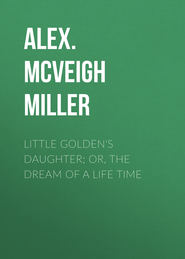По всем вопросам обращайтесь на: info@litportal.ru
(©) 2003-2024.
✖
Lancaster's Choice
Автор
Год написания книги
2018
Настройки чтения
Размер шрифта
Высота строк
Поля
"This way, then, my dear," said Mrs. West. She led the girl through her own neat bedroom, into a prettier one, small, but furnished with a white bed, a blue carpet, and some blue chairs—these latter also the spoils of the garret, but looking very well after the furbishing Mrs. West had given them.
Leonora cast a rapid, comprehensive glance around her, then went over to the ewer and bathed her face and hands.
"I hope your room suits you, Leonora," said Mrs. West, lingering, and half-abashed. Something about the fair, self-possessed girl seemed to vaguely suggest better things. Beside her grace and beauty the room looked poor and mean.
"Oh, yes, thank you, aunt," Leonora returned, quietly. She had taken her combs and brushes out of her dressing-bag now, and Mrs. West saw that they were an expensive set, pearl and silver-backed, as elegant as Lady Lancaster's own.
"My dear, could your papa afford handsome things like these?" she said.
Leonora flushed rose red.
"Not always," she said. "But he was very extravagant whenever he had money. He made a great pet of me, and sometimes—when he had good luck—he bought the loveliest things for me. Perhaps, if he had taken more care of his money, you need not have been burdened with the care of his orphan daughter now."
There was a dejected tone in her voice that went straight to the housekeeper's womanly heart.
"Oh, you poor fatherless child!" she cried. "Do you think I could mind dividing my savings with Dick West's child? He was a bonny lad, was Dick! I always loved him, although he was no real kin to me, and only my husband's brother."
Leonora's eyes shone very bright now through the tears that filled them.
"Oh, Aunt West, you will love me too a little, then—for poor papa's sake!" she cried, and Mrs. West answered, with sudden warmth and tenderness:
"Indeed I will, dear. You shall be like my own daughter to me."
A moment later she added, ruefully:
"I'm sorry I could not have a nicer room for you, Leonora. But, you see, I thought this would do very well for a child."
"Oh, indeed, it does not matter in the least. I shall not stay in it much. I shall be out-of-doors nearly all the time."
CHAPTER XVIII
Leonora spoke in such a composed, matter-of-fact tone that she was surprised at its effect upon her aunt.
The good lady uttered an exclamation almost amounting to terror, and stood regarding her niece with such a rueful and amazed face that the girl burst into a peal of sweet, high-pitched laughter.
"Oh, my dear aunt," she cried, as she vigorously brushed out her thick plaits of hair into loose, shining ripples over her shoulders, "what have I said to shock you so?"
"I'm not shocked, my dear," said the good soul, recovering herself, with a gasp. "What put such an idea in your head? But what did you say, child," anxiously, "about being out all day?"
"I said it didn't matter about the room, as I didn't expect to stay in it much. I love fresh air, Aunt West, and I shall be out-doors nearly all the time."
"I'm afraid that won't do here, my love," suggested the housekeeper, timidly.
"Why not?" said Leonora, amazed; then she colored, and said, demurely: "Oh, yes, I understand now. You can not spare me. I shall have to help work for my living."
"No, you shall not," indignantly; "I did not mean that at all. I should be mean if I thought of such a thing. But there's Lady Lancaster. She wouldn't like it."
A pretty little frown came between Leonora's straight, dark brows.
"Wouldn't you like me to go out-doors? Is that what you mean?" she asked, and when Mrs. West answered "Yes," she said, angrily and decidedly:
"Lady Lancaster has nothing to do with my movements, and I don't suppose she will grudge me a breath of God's free air and sunshine even if I walk in her grounds to obtain them."
"But I promised her—" said Mrs. West, then paused bashfully.
"I hope you didn't promise her to bury me alive in this musty little chamber, at all events," said the girl, with an irreverent glance around her.
"Yes, I did. At least I promised to keep you out of her sight. She does not like children."
"I'm not a child," said Leonora, looking her tallest.
"Yes. I forgot that. I will ask her if her objections extend to a young lady," Mrs. West said, with a hesitating air. She was a little afraid of a contretemps of some kind. The girl's great eyes were flashing, her pretty red lips curling disdainfully.
"Aunt West, are you going to stay on at Lancaster Park, and am I to stay here with you?" she asked, slowly.
"That was my expectation, dear," the housekeeper answered, mildly.
"And—am I here on Lady Lancaster's sufferance? Am I—hired to her?"
"Why, no, of course not, Leonora, child. She has nothing at all to do with you. My lady was very kind. She did not send me away because I was about to adopt a daughter. She permitted me to have you here, and she made but one condition."
"And that?"
"That I was to keep you limited to my rooms—to keep you out of her sight. She did not want to be pestered by a child."
"Ah!" Leonora drew a long breath, as with her white fingers she patted the soft rings of hair down upon her white forehead.
"Yes, you can not blame her, surely, dear. You see, my lady is an old woman. She is eighty years old, and she has never had any children. So of course she would not like to be bothered with other people's. She is very ill-natured, and very peculiar, but perhaps when she finds out you are a young lady she will not care if you go out into the grounds some."
"And to the house, Aunt West—am not I to go over that? Papa has told me so much about these grand old English homes. I should like to go over one so much," said the girl.
"I will take you over the house myself, some day. You shall see it, never fear, child, but not for some time yet. You see, the place is full of grand company now."
"Lady Lancaster's company?" asked Leonora.
"Why, yes, of course," said Mrs. West. "She has twenty guests—fine, fashionable people from London, and they are all very gay indeed. You shall see them all at dinner this evening. I will find you a peep-hole. It will be a fine sight for you."
"I dare say," said Leonora, speaking rather indistinctly, because she had two pins in her mouth and was fastening a clean linen collar around her neck.
"How coolly she takes things! I suppose that is the American way," thought Mrs. West. "But then of course she can have no idea what a brave sight it is to see the English nobility dining at a great country-house. She will be quite dazzled by the black coats and shining jewels and beautiful dresses. I don't suppose they have anything like it in her country," mused the good woman, whose ideas of America were so vague that she did not suppose it had advanced very far from the condition in which Columbus discovered it.
"I should not think," said her niece, breaking in upon these silent cogitations, "that Lady Lancaster, being so old—'one foot in the grave and the other on the brink,' as they say—would care about all that gay company around her. Does she lead such a life always?"
"Oh, no. It is only now and then she is so dissipated. But she must keep up the dignity of the Hall, you know, for the sake of Lord Lancaster. All this present gayety is in honor of his return."
"Has Lord Lancaster been abroad, then?" Leonora asked, carelessly.
"Why, my love, what a strange question!" said her aunt, staring.
Leonora cast a rapid, comprehensive glance around her, then went over to the ewer and bathed her face and hands.
"I hope your room suits you, Leonora," said Mrs. West, lingering, and half-abashed. Something about the fair, self-possessed girl seemed to vaguely suggest better things. Beside her grace and beauty the room looked poor and mean.
"Oh, yes, thank you, aunt," Leonora returned, quietly. She had taken her combs and brushes out of her dressing-bag now, and Mrs. West saw that they were an expensive set, pearl and silver-backed, as elegant as Lady Lancaster's own.
"My dear, could your papa afford handsome things like these?" she said.
Leonora flushed rose red.
"Not always," she said. "But he was very extravagant whenever he had money. He made a great pet of me, and sometimes—when he had good luck—he bought the loveliest things for me. Perhaps, if he had taken more care of his money, you need not have been burdened with the care of his orphan daughter now."
There was a dejected tone in her voice that went straight to the housekeeper's womanly heart.
"Oh, you poor fatherless child!" she cried. "Do you think I could mind dividing my savings with Dick West's child? He was a bonny lad, was Dick! I always loved him, although he was no real kin to me, and only my husband's brother."
Leonora's eyes shone very bright now through the tears that filled them.
"Oh, Aunt West, you will love me too a little, then—for poor papa's sake!" she cried, and Mrs. West answered, with sudden warmth and tenderness:
"Indeed I will, dear. You shall be like my own daughter to me."
A moment later she added, ruefully:
"I'm sorry I could not have a nicer room for you, Leonora. But, you see, I thought this would do very well for a child."
"Oh, indeed, it does not matter in the least. I shall not stay in it much. I shall be out-of-doors nearly all the time."
CHAPTER XVIII
Leonora spoke in such a composed, matter-of-fact tone that she was surprised at its effect upon her aunt.
The good lady uttered an exclamation almost amounting to terror, and stood regarding her niece with such a rueful and amazed face that the girl burst into a peal of sweet, high-pitched laughter.
"Oh, my dear aunt," she cried, as she vigorously brushed out her thick plaits of hair into loose, shining ripples over her shoulders, "what have I said to shock you so?"
"I'm not shocked, my dear," said the good soul, recovering herself, with a gasp. "What put such an idea in your head? But what did you say, child," anxiously, "about being out all day?"
"I said it didn't matter about the room, as I didn't expect to stay in it much. I love fresh air, Aunt West, and I shall be out-doors nearly all the time."
"I'm afraid that won't do here, my love," suggested the housekeeper, timidly.
"Why not?" said Leonora, amazed; then she colored, and said, demurely: "Oh, yes, I understand now. You can not spare me. I shall have to help work for my living."
"No, you shall not," indignantly; "I did not mean that at all. I should be mean if I thought of such a thing. But there's Lady Lancaster. She wouldn't like it."
A pretty little frown came between Leonora's straight, dark brows.
"Wouldn't you like me to go out-doors? Is that what you mean?" she asked, and when Mrs. West answered "Yes," she said, angrily and decidedly:
"Lady Lancaster has nothing to do with my movements, and I don't suppose she will grudge me a breath of God's free air and sunshine even if I walk in her grounds to obtain them."
"But I promised her—" said Mrs. West, then paused bashfully.
"I hope you didn't promise her to bury me alive in this musty little chamber, at all events," said the girl, with an irreverent glance around her.
"Yes, I did. At least I promised to keep you out of her sight. She does not like children."
"I'm not a child," said Leonora, looking her tallest.
"Yes. I forgot that. I will ask her if her objections extend to a young lady," Mrs. West said, with a hesitating air. She was a little afraid of a contretemps of some kind. The girl's great eyes were flashing, her pretty red lips curling disdainfully.
"Aunt West, are you going to stay on at Lancaster Park, and am I to stay here with you?" she asked, slowly.
"That was my expectation, dear," the housekeeper answered, mildly.
"And—am I here on Lady Lancaster's sufferance? Am I—hired to her?"
"Why, no, of course not, Leonora, child. She has nothing at all to do with you. My lady was very kind. She did not send me away because I was about to adopt a daughter. She permitted me to have you here, and she made but one condition."
"And that?"
"That I was to keep you limited to my rooms—to keep you out of her sight. She did not want to be pestered by a child."
"Ah!" Leonora drew a long breath, as with her white fingers she patted the soft rings of hair down upon her white forehead.
"Yes, you can not blame her, surely, dear. You see, my lady is an old woman. She is eighty years old, and she has never had any children. So of course she would not like to be bothered with other people's. She is very ill-natured, and very peculiar, but perhaps when she finds out you are a young lady she will not care if you go out into the grounds some."
"And to the house, Aunt West—am not I to go over that? Papa has told me so much about these grand old English homes. I should like to go over one so much," said the girl.
"I will take you over the house myself, some day. You shall see it, never fear, child, but not for some time yet. You see, the place is full of grand company now."
"Lady Lancaster's company?" asked Leonora.
"Why, yes, of course," said Mrs. West. "She has twenty guests—fine, fashionable people from London, and they are all very gay indeed. You shall see them all at dinner this evening. I will find you a peep-hole. It will be a fine sight for you."
"I dare say," said Leonora, speaking rather indistinctly, because she had two pins in her mouth and was fastening a clean linen collar around her neck.
"How coolly she takes things! I suppose that is the American way," thought Mrs. West. "But then of course she can have no idea what a brave sight it is to see the English nobility dining at a great country-house. She will be quite dazzled by the black coats and shining jewels and beautiful dresses. I don't suppose they have anything like it in her country," mused the good woman, whose ideas of America were so vague that she did not suppose it had advanced very far from the condition in which Columbus discovered it.
"I should not think," said her niece, breaking in upon these silent cogitations, "that Lady Lancaster, being so old—'one foot in the grave and the other on the brink,' as they say—would care about all that gay company around her. Does she lead such a life always?"
"Oh, no. It is only now and then she is so dissipated. But she must keep up the dignity of the Hall, you know, for the sake of Lord Lancaster. All this present gayety is in honor of his return."
"Has Lord Lancaster been abroad, then?" Leonora asked, carelessly.
"Why, my love, what a strange question!" said her aunt, staring.











